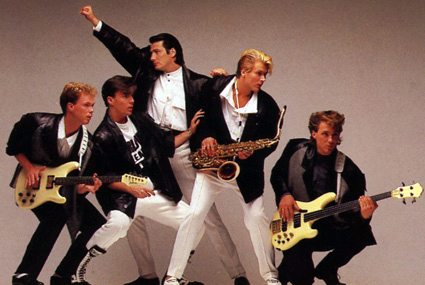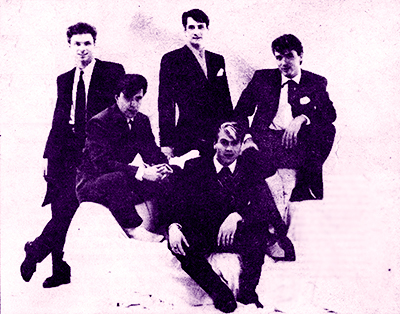
|
Search JoyZine with Google Site Search! |
Spandau Ballet Interview by Kevin Hardiman
The band's debut album, Journeys to Glory (1981), ushered in a period in which they became the hippest group in Britain. Their sound during this period was experimental electronic pop with leanings toward white funk, influenced by their love of the new London club culture. A shift toward a more commercial style on Diamond (1982) was given the thumbs down by fans. They had their first failure, prompting them to bring in production maestro Trevor Horn to remix "Extinction." Horn's panoramic pyrotechnics restored them to the Top 10, and from that point Spandau became an out-and-out pop band. Ditching the band's already passé New Romantic look, they took to wearing Armani suits, and Gary Kemp's songwriting became less abstract as they looked toward the lucrative American market. With Tony Swain and Steve Jolly—who also worked with Madness and Bananarama—taking over production duties, Spandau Ballet embarked on the most successful period of their career. They topped the with True (1983) and took its moody late-night title track to #1 across Europe, and later #4 in America. Kevin Hardiman talks to Martin Kemp, bassist for Spandau Ballet on the eve of their San Francisco debut. Q: Did you ever, in your wildest dreams, imagine you'd be this popular and successful? MARTIN: Yes. Absolutely. If there's one word that sums up Spandau Ballet, the five-year-old quintet from the Islington section of London, it is confidence. To listen to Martin Kemp, there was nothing since the early days of the Sixties worth a shit until he, his brother Gary, Tony Hadley, John Keeble and Steve Norman came along and "changed the course of British pop." "It was getting to the point where kids were waiting for autographs from footballers rather than pop stars," stated Kemp (in the plush surroundings of the Sir Francis Drake Hotel—this band does things in style!) He was speaking of the mid-Seventies, when the charts were filled with the likes of Pink Floyd and Supertramp, detached superstars who were hard to relate to on a human level. "Punk provided the answer for a year or so, but the problem was that none of the punk bands could sell enough records to make a lasting impact. And since they were so young they were often ripped off by the record companies. We were fortunate that we could learn from their mistakes." Immediately upon formation in 1979, Spandau Ballet set themselves apart from the pack. They claimed American 12" soul singles as their greatest influences, and gave their first performances before invited audiences of fashion designers and the like, rather than sweating away on the English club circuit. "The days of slogging around the countryside are over, now that there are so many other ways to express yourselves," stated Kemp, in an obvious reference to the video revolution. "When we play live we do it right, and that's why we've never toured the States before. We've a policy of never touring without a hit single. If we'd done a club tour here before we'd had a hit with 'True' we wouldn't have been able to bring our complete stage set and lighting, and the audience would have seen only half the show. Now, we can play to 2000-3000 people and give the full treatment... and those only familiar with 'True' will be in for a surprise.
They certainly must have been, for at the Warfield that song, which broke Spandau in America. was the only slow number of an excellent up-tempo set that covered all three of the group's LPs and showcased numerous style changes. "Occasionally, we've seen a few shocked faces at first," Kemp said of their American audiences, "But we've won them over. Never, anywhere, have people stayed in their seats." Before "True" the American perception of Spandau Ballet was limited and somewhat negative. At first, the band was in certain national periodicals as a fey, trendy and pretentious reaction to the failure of punk. "There was no such thing as a 'new romantic,'" according to Martin Kemp. "It was just a bunch of kids dressing up and having a really good time. A lot of people didn't realize that the kids at Camden Palace and Blitz weren't just standing at the bar to pose, they were actually getting very drunk as well." The group's image here wasn't helped by their American "debut" in 1981 at New York's Underground and by Gary Kemp's well-publicized comment that the "music was completely irrelevant." Martin explained that the show was "Nothing but a holiday for us. We'd done well at home, so we took about thirty people to New York after being asked to do a gig, and spent as much money as possible. It was just a laugh!" More recently, Spandau has been faced with another image problem in the States—the continued classification with Duran Duran, Wham! and other English groups that followed Spandau's lead in the U.K. but broke first over here. Martin Kemp showed no bitterness about this, though. "I'd much rather compete with Duran Duran and Culture Club than with Paul McCartney or John Cougar [Mellencamp]. At least it's still kids playing for kids. We happen to make much better records than Duran Duran, and in England we carry a great deal more respect than they do. As for Wham!, they're good mates of ours. They just go about things wrong." "Personally, I'd like to see it like the Sixties, when The Animals could get onstage and do a Who song and no one would think anything of it., it was such a cooperative thing. When they toured the States back then, it was like they were taking over the world or something. Then in the Seventies it got to the point where Supertramp or E.L.O. would do their American tours when the electric bills were due. We're over here for fun. We make money along the way but that's not the point. I'd much rather we headed a chapter in a book on changing musical styles and not sell a single record, than be in some dispensable group like Haircut 100." Whether Spandau Ballet will ever headline that chapter remains to be seen. The influences of David Bowie and Roxy Music on their stage act will inevitably be noticed, but this doesn't detract from the band's basic quality and determination. Though the True LP has given them a strong foothold in the U.S., the near future is crucial. The next album, which Kemp promises will be "a lot more aggressive," will have to establish a strong, memorable identity for Spandau Ballet to even the most casual listener. |

